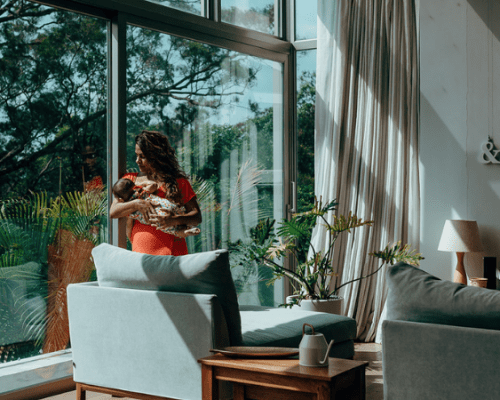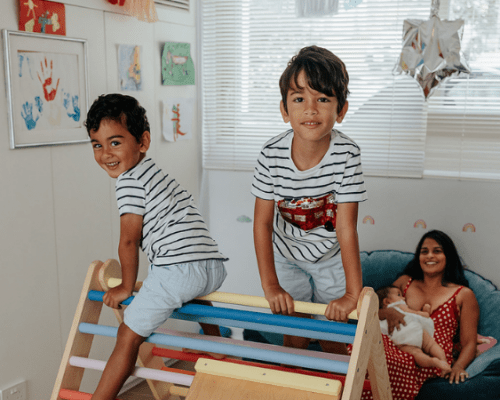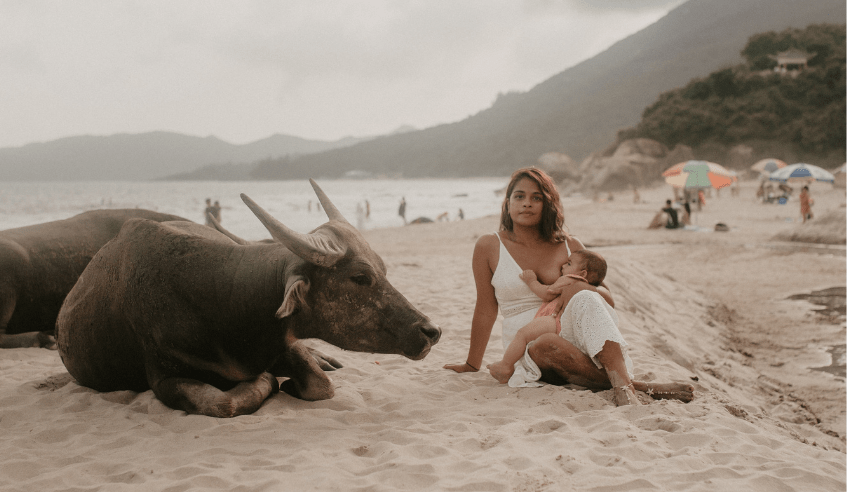Through her #Ittasteslikelove campaign, Cheung Sha resident Liz Thomas champions nursing mothers’ right to breastfeed – however, wherever, whenever
REPORTING BY Ray Au PHOTOS BY Teresa Laqua, Teschka Takes Pictures & Karen Holt Photography for #Ittasteslikelove
Liz Thomas came up with the idea for #Ittasteslikelove (www.ittasteslikelove.org back in 2019 when she was living in Discovery Bay. Now based in Cheung Sha, with her husband and three children, the full-time working mum continues her mission to normalise breastfeeding and encourage all of us to stand up for nursing mothers’ rights.
“#Ittasteslikelove works with the community to make sure parents who want to breastfeed know there is support there for them,” Liz opens. “Our Instagram account showcases breastfeeding as art; we use Facebook for sharing the latest research, science and discussion; and the website offers guides, advice and incentives from our various supporters. A popular element is our stories section which features reports of motherhood from the trenches.”
Governments, health authorities, children’s charities, WHO, and international policymakers all extoll the benefits of breastfeeding. The science is clear, the public health benefits are clear, and the economic benefits are clear. So why is breastfeeding taboo? Why do we make it so hard for women to do it?
“That’s what the campaign is trying to address,” says Liz. “If we want more women to breastfeed, and the consensus is that we do, then it is a shared responsibility to make that happen.”
This year’s World Breastfeeding Week (waba.org.my/wbw), August 1 to 7, is themed ‘Breastfeeding: A Shared Responsibility,’ and Liz has taken the opportunity to reach further out into the community. More than 200 businesses and brands now back #Ittasteslikelove, empowering breastfeeding mothers by promising their place is a safe space to nurse.
Liz has garnered plenty of support on home turf from South Lantau concerns, such as Lantana, VIBE Book & Music Shop, The Village Bakery, Pause, Grill House by CAPO Group, Southside Lantau and Natural Plus. That is in addition to long-term DB supporters including Hemingway’s, Kapuhala Space and Treece Fitness, and Hong Kong-wide players like Grand Hyatt Hong Kong, Pizza Express, Pret A Manger, Maximal Concepts and Black Sheep Restaurants.
“As more and more places actively support nursing in public, people will think twice about voicing their disapproval, and after a while they may see there is no need to be disapproving at all,” Liz says. “Then the real changes can begin.”
SILENCING BREASTFEEDING CRITICS
Q: A lot of people have a hard time dealing with female breasts unless, of course, they’re being used to sell or seduce. Why do you think that is?
A: “People have grown unused to seeing breasts used for their primary purpose and are generally uncomfortable with abrupt social change. People still feel entitled to project their discomfort instead of learning to deal with it rationally.”
Q: According to UNICEF, some 40% of women who breastfeed in public in Hong Kong have had negative experiences. Do you find this statistic surprising?
A: “Wearily unsurprising. This happens more often than people realise – even in hospitals. When my eldest was born prematurely at Queen Mary Hospital, the nurses in the special care unit were more concerned about my modesty, in case “male doctors might mind,” than actually helping me breastfeed.”
Q: And how about the now infamous incident in DB…?
A: “I have breastfed all over the city, but outside of the public health system and overzealous security guards, Discovery Bay has been the place where I’ve had the most ‘issues’ for openly breastfeeding. “The most notable incident was when I was breastfeeding on a bus. About half way through the journey, the middle-aged woman next to me – who had been engrossed on her phone – noticed me and began shouting “cover yourself.” It was one of those rare moments in life when I actually thought of a snappy response at the time it was needed. It struck me that I was actually wearing more clothes than her, so I pointed that out. It did shut her up, but I doubt she understood the hypocrisy.”

Q: Are South Lantauers more… supportive?
A: “I find it’s generally a little more live and let live here. I am tandem feeding my three-year-old and my baby and so far, no one’s batted an eyelid.”
SETTING WORKPLACE STANDARDS
Q: What kind of progress has #Ittasteslikelove seen for acceptance of breastfeeding, particularly for working mums?
A: “Hong Kong has some beautiful nursing rooms in the newer office buildings and malls, far better than any I’ve seen elsewhere in the world. So yes, it is nice that this is being thought about. But ultimately it still comes down to choice. Far better that we stop the misogynistic thinking around breastfeeding so that people feel free to nurse on the go if they wish to.
“The increase in maternity leave from 10 to 14 weeks is a step in the right direction, though if authorities genuinely wanted more women to nurse exclusively to the WHO recommendation of six months, then that should be the minimum leave.”
Q: What of your own experience at work?
A: “When I returned to work after my second son was born, the initial shock of seeing me pump at my desk in the newsroom (the best option based on government guidelines) led to greater understanding and tolerance among staff of exactly how challenging it is to be a working mother to young children. I think COVID-19 has underlined how important good hygiene is and how inappropriate it is to ask people to produce nourishment for babies anywhere you wouldn’t eat yourself.
“If businesses can think creatively to tackle life with the virus, they can think creatively on how best to ensure that being a parent – particularly a mother – doesn’t disqualify you from career progression.”
CHANGING THE CONVERSATION
Q: At its core the “#Ittasteslikelove campaign is a women’s rights mission?
A: “No doubt. And it is also part of a wider conversation about women and public health. Right now, breastfeeding helps prevent an estimated 20,000 deaths from breast cancer and, if those figures rise, tens of thousands more could survive.
“WHO says normalising breastfeeding so that every baby is exclusively breastfed to its guideline of six months (currently the figure is just one in three globally) would mean 800,000 more children would survive each year. It would also save US$300 billion in healthcare costs.”
Q: And breastfeeding is kind to the earth?
A: “Breast milk is the original zero-waste superfood – normalising breastfeeding will help reduce the environmental impact of formula, usually made from cow’s milk. In the UK, scientists at Imperial College London found that if every mother met WHO nursing targets, it would be equivalent to taking more than 77,000 cars off the road each year.”
Q: What’s the next big challenge for #Ittasteslikelove?
A: “We’ll be expanding across different industries and working with each generation of new mothers to ensure they know there are places, businesses and people that will stand up for them and offer their premises as a safe space to nurse.
“Things are inching forward. When I talk to companies about supporting the campaign, it is much easier now than when we launched for them to see why it’s important. “Social media has helped drive that. The TikTok/ Instagram generation documents every aspect of their lives online and, as they become parents, breastfeeding is simply another part of what they’re doing. I think imagery makes such a difference when normalising any behaviour. The more people see something, the less shocking it becomes. It’s one of the reasons we have a dedicated Instagram feed full of beautiful breastfeeding imagery.”


